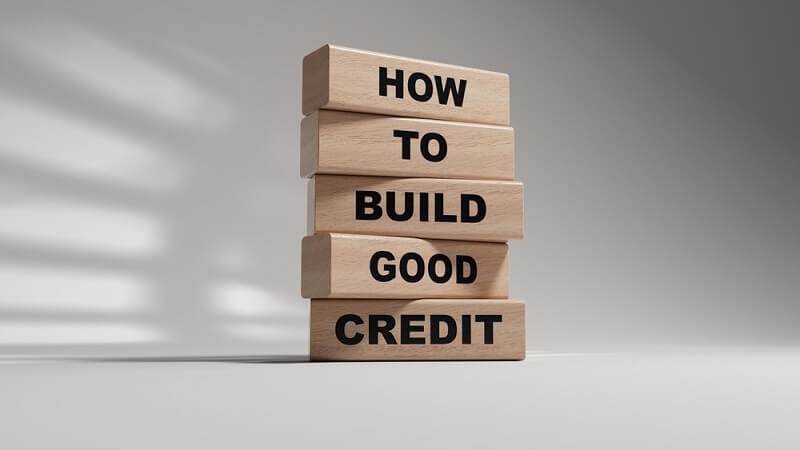How to Build Credit and Boost Your Financial Future

Learning how to build credit is one of the most critical steps to reaching financial independence. If you're building credit for the first time or working to improve your credit score, it's essential to understand how credit works. Your credit history impacts the decision about whether or not you get approved for loans, what interest rates you receive, and even, in some cases, your efforts to secure employment. If you understand how to establish your credit history, you're setting the stage for strong financial building blocks and easier borrowing down the road.
Building credit takes time and consistency, but with the right tips and strategies, you can start to see progress sooner rather than later. Let's explore the key ways to establish, manage, and grow an equitable credit profile.
Why Credit Matters for Your Financial Health
A credit score is a numerical representation of your reliability as a borrower. Lenders use this figure to assess your creditworthiness. The better your score, the more access you will have to credit, and interest rates will generally be reduced; financial opportunities will also be significantly enhanced.
Not having a credit history is equally as limiting as having a poor one. Therefore, it is essential to have a credit history at an early age. With a satisfactory score, you can qualify for credit cards, mortgage loans, or car loans—often with much better terms.
Best Ways to Build Credit Fast for Beginners
If you’re new to the credit world, don’t panic. There are numerous effective strategies to build credit quickly if you've never had it before. Here are some tried and true, real-life suggestions to get you started:
- Apply for a secured credit card: A secured credit card requires you to make a cash deposit, which is your credit limit. Use the secured card for small purchases that you can afford. Pay this card off every month; this way, lenders can see that you borrow responsibly.
- Become an authorized user: Reach out to a trusted family member or friend to add you as an authorized user on their credit card. The authorized cardholder's positive payment history can help you quickly build credit from zero.
- Pay all bills on time: Making consistent, on-time payments accounts for a majority of your overall credit score. Just one missed payment can significantly delay your progress.
- Maintain low credit utilization: Try to stay under 30% of your available credit. Keeping your credit utilization low demonstrates to lenders that you can manage your finances responsibly.
- Check your credit reports regularly: You should periodically check your credit reports for errors, unauthorized activity, or possible fraud on all your accounts before they affect your score.
By simply taking these steps, you are on your way to establishing a positive track record and quickly building credit from scratch.
How to Build Credit History with the Right Accounts
When establishing credit, it is crucial to choose accounts that are suitable and manageable for your financial situation. There are a couple of great ways to get started:
- A credit-builder loan: These are easy, small loans that many community banks and credit unions offer for the sake of building someone's credit history. You would be required to make fixed monthly payments of principal and interest. The lender will also report your payments to the credit-reporting agency.
- A store credit card: Retail store cards are quite often easier to get if you have been unable to secure a traditional credit card. If you choose this route, remember to always pay on time and settle each one you accumulate before the statement closes. So you don't have to deal with a very high interest rate, and you are not accumulating increased debt.
- A student credit card: If you are enrolled in college, student credit cards can be pretty easy to get and can be a good entry to credit history. Student credit cards typically have lower credit limits and more stringent credit eligibility requirements.
The most crucial idea to understand is to manage each account responsibly. Building a credit profile doesn't always correlate with the age of an account; in fact, it is mainly determined by how you manage your accounts.
Credit Building Tips to Maintain a Good Score

After you've opened a credit account, it is best to keep it open. Here are some excellent credit-building tips to do just that:
- Pay more than the minimum payment owed: Paying more than the minimum amount each month will help to lower your balance quicker and bring down your credit utilization ratio faster.
- Do not close old credit accounts: Your credit history (or length of credit inquiry) is part of your overall credit score; therefore, the more accounts you keep open—old or new (even with no use and payments)—the more credit history you provide to your lenders.
- Be cautious about hard pulls: If you open too many application accounts at once, your score will decline temporarily. If you must consider opening accounts, do so with caution by applying only when necessary.
- Mix your credit: A mix of types of credit accounts (credit card, particular loans, retail accounts, etc.) shows lenders how responsible you are in keeping track of and managing various kinds of credit.
- Automate your payments: This helps keep track of missed due dates and/or late fees.
These are small but consistent changes that can have an impact over time.
Improving Credit Score After Establishing Credit
After establishing some initial credit history, your next goal is to improve your credit score and the associated financial benefits. Improving your score does not happen immediately, but consistently doing specific things will move the needle in the right direction.
What you can do to strengthen your score:
- Dispute errors: Typographical errors on your credit report can negatively impact your score unfairly. Disputing the mistakes as quickly as possible is essential.
- Pay off debt with high interest: Paying down the balance and reducing your credit balances will improve your credit utilization rate, one of the most significant factors affecting your credit score.
- Do everything possible to avoid late payments: A single late payment can follow you for years; your goal is not to have a late fee at all. A reminder and/or automating your bills will help significantly to avoid this.
- Keep a healthy balance-to-limit ratio: Trying to keep your balances below 10 percent of available credit is best, if you can.
These strategies can enhance your credit score, bolster your credit profile, and have a lasting positive impact on the overall financial aspects of your life.
Common Mistakes to Avoid When Building Credit
It is just as important to know what not to do as it is to learn how to build credit. If you can avoid the following mistakes, you will halt the downward trend of a poor credit score:
- Missing payments: Missing a payment can hurt your score significantly.
- Carrying high balances: Maxing out your credit card will indicate to a lender that you have poor money management.
- Applying for too many lines of credit: These applications and inquiries make you look like a risk to a lender.
- Ignoring your credit report: You may not know there is an error or fraud on your report if you don’t check it.
If you can avoid these common mistakes and build credit from scratch the proper way, you can concentrate on building strategies that will work.
Tracking Your Progress and Staying Consistent
As you apply these credit-building tips, consistency is your greatest ally. Check your credit score periodically using free online tools to stay informed about your credit history. Monitoring progress helps you stay motivated and identify areas for improvement.
Building and improving a credit score takes time, but every timely payment, every low balance, and every responsible credit decision adds up. Over time, you’ll not only have a higher credit score but also greater access to financial opportunities.
Final Thoughts on How to Build Credit
Learning how to build credit is more than just opening accounts—it’s about building habits that demonstrate responsibility and reliability. With patience and consistent effort, you can make credit from scratch, start a credit history smartly, and use these credit-building tips to achieve financial stability. A strong credit score unlocks better opportunities and long-term financial freedom.
This content was created by AI

